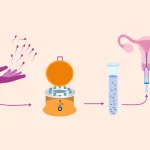How Long Can You Freeze Sperm for IVF? Storage Limits Explained
Fertility science has come a long way, giving individuals and couples more control over when and how they start a family. One of the most effective methods of preserving fertility today is sperm freezing, also known as sperm cryopreservation. But many people considering this option wonder, how long can you freeze sperm for IVF?
The short answer: frozen sperm can last for decades, perhaps even indefinitely, when stored correctly. Whether you’re preserving sperm before medical treatment, delaying parenthood, or donating to a fertility program, the freezing process ensures sperm remains viable for future use in IVF (in vitro fertilization) and other fertility treatments.
In this article, we’ll explain how sperm freezing works, how long it can last, what factors affect its success, and what to expect when using frozen sperm in IVF.
What Is Sperm Freezing?

Sperm freezing is a medical process that preserves male reproductive cells at extremely low temperatures, typically around -196°C (-320°F) using liquid nitrogen. At this temperature, all biological activity, including cell aging, stops entirely.
This method allows sperm to remain biologically unchanged for years. When thawed properly, many samples retain excellent fertilization potential, especially when used in IVF or ICSI (intracytoplasmic sperm injection).
Common Reasons for Sperm Freezing Include:
- Before medical treatments like chemotherapy or radiation, which may affect fertility.
- For sperm donors, allowing samples to be tested and used later.
- Before a vasectomy, as a precaution in case future conception is desired.
- For couples undergoing IVF, especially when scheduling or travel conflicts occur.
- For transgender individuals, preserving fertility before hormone therapy or surgery.
Sperm freezing is a safe, well-established process that has been used successfully for decades in fertility clinics worldwide.
How Long Can You Freeze Sperm for IVF?
One of the biggest advantages of sperm freezing is that time has almost no effect on the viability of the sample once it’s stored under the right conditions.
Studies have shown that sperm can remain viable for over 20 years, and in some documented cases, pregnancies have occurred with sperm stored for more than 30 years.
This is because freezing suspends all biological activity, meaning the sperm essentially “pauses in time.” As long as the sample remains in liquid nitrogen and the storage environment is stable, it does not degrade.
To summarize:
- 5–10 years: Common storage duration for most fertility plans.
- 20+ years: Sperm remains viable with little to no decrease in fertility potential.
- 30+ years: Successful pregnancies have been reported from samples stored this long.
Most fertility clinics, however, renew storage agreements every few years to ensure the patient still wishes to maintain or use the sample.
Does Freezing Affect Sperm Quality?
While modern cryopreservation techniques are highly effective, not all sperm survive the freezing and thawing process. Typically, 50–70% of sperm remain motile after thawing.
However, advanced IVF techniques such as ICSI (where a single sperm is directly injected into an egg) make it possible to achieve excellent fertilization and pregnancy rates even with smaller quantities of viable sperm.
Factors that influence post-thaw sperm quality include:
- Initial sperm health before freezing
- Freezing rate and type of cryoprotectant used
- Storage consistency (temperature and environment)
- Proper thawing procedures
In general, sperm frozen at reputable fertility clinics maintain high functionality and fertility potential for many years.
How Is Sperm Frozen for IVF?
The process of sperm cryopreservation is straightforward, safe, and highly regulated. Here’s what typically happens:
- Sample Collection
The patient provides a semen sample, usually through masturbation, in a sterile container at the clinic. - Semen Analysis
The lab examines the sample for sperm count, motility, and morphology (shape). - Addition of Cryoprotectant
A special solution is added to protect sperm cells from damage during freezing. - Freezing Process
The sample is slowly cooled and then plunged into liquid nitrogen at -196°C. - Storage
The frozen sperm is stored in secure cryogenic tanks, labeled and logged for future retrieval.
This entire process ensures that when the sperm is needed, even years later, it can be safely thawed and used in fertility treatments like IVF.
Using Frozen Sperm for IVF
When it’s time to use frozen sperm for IVF, the clinic carefully thaws the sample under controlled conditions. After thawing, the sperm is analyzed again to ensure it’s suitable for fertilization.
Depending on the sample’s quality, one of the following methods may be used:
- Conventional IVF: The sperm and egg are combined in a lab dish to allow natural fertilization.
- ICSI (Intracytoplasmic Sperm Injection): A single sperm is injected directly into the egg to maximize the chance of fertilization.
Both methods have comparable success rates when using frozen sperm, as long as the freezing and thawing processes were done correctly.
Long-Term Storage and Legal Considerations

Although sperm can remain viable indefinitely, storage duration often depends on legal regulations in each country or region.
For instance:
- Some clinics have default storage terms of 10 years, renewable upon request.
- Others require patients to renew consent forms periodically to continue storage.
- In cases of donor sperm, specific laws govern how long samples can be stored and used.
In Nigeria and other regions with similar guidelines, storage contracts are usually renewable to ensure proper consent and record-keeping. It’s important to discuss renewal fees and time limits with your clinic in advance.
Factors That Affect the Success of Using Frozen Sperm in IVF
While sperm can last for decades, successful fertilization depends on multiple factors beyond storage time:
- Age and fertility health of the female partner or egg donor
- Quality of eggs and embryos
- Experience of the fertility clinic
- Underlying health conditions
So while the sperm itself may remain perfectly preserved, the overall IVF outcome still depends on these variables.
Advantages of Freezing Sperm for IVF
Freezing sperm provides flexibility and peace of mind. The key benefits include:
- Long-term fertility preservation for men facing medical treatments or surgeries
- Flexibility for IVF scheduling, ensuring samples are available when needed
- Backup protection in case of travel, health, or logistical challenges
- Sperm donation programs that ensure safety and testing before use
For couples undergoing IVF, sperm freezing eliminates the stress of timing or unexpected complications during egg retrieval.
Final Thoughts
So, how long can you freeze sperm for IVF? Technically, there’s no expiration date when stored at -196°C; sperm can last for decades without losing fertility potential.
With today’s cryopreservation technology, families can plan ahead, preserve reproductive options, and ensure the possibility of conception when the time is right.
If you’re considering sperm freezing for IVF, the most important step is choosing a trusted fertility clinic with proven expertise and proper storage facilities.
At The Bridge Clinic, we specialize in advanced fertility preservation, including sperm freezing and IVF treatment. Whether you’re planning for the future or starting your fertility journey now, our experts provide compassionate guidance and cutting-edge care every step of the way.
Contact The Bridge Clinic today to learn more about our sperm freezing options and IVF services, and take control of your reproductive health with confidence.
Follow us on our social media channels below:
Explore our related articles below:








